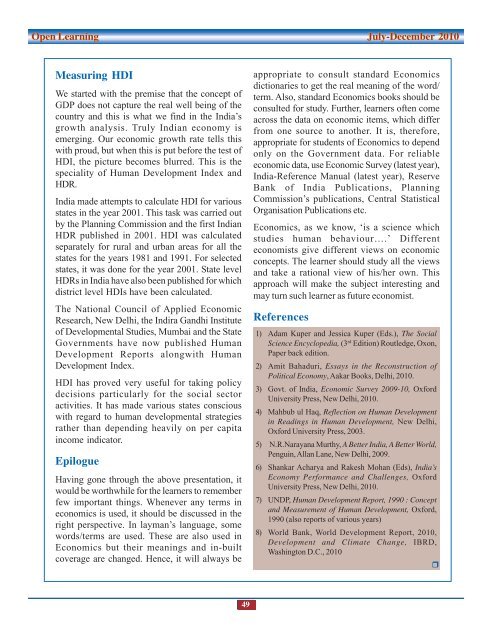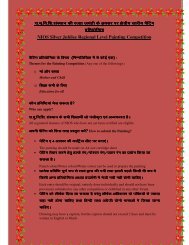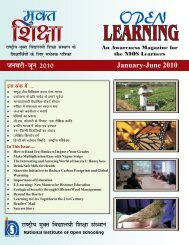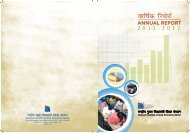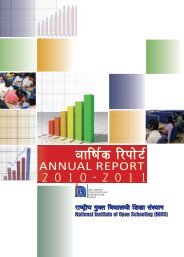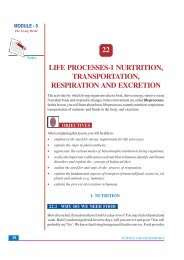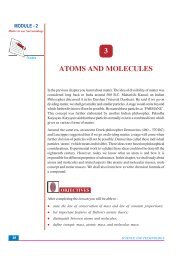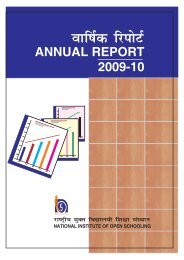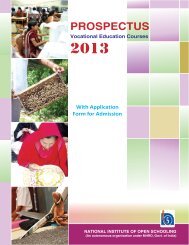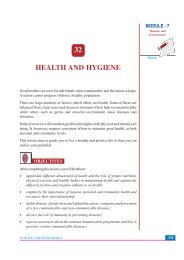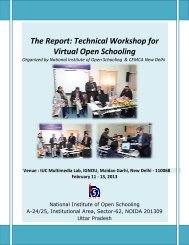Open Learning July-December -2010 - The National Institute of ...
Open Learning July-December -2010 - The National Institute of ...
Open Learning July-December -2010 - The National Institute of ...
You also want an ePaper? Increase the reach of your titles
YUMPU automatically turns print PDFs into web optimized ePapers that Google loves.
tqykbZ&fnlacj <strong>2010</strong><br />
eqDr f'k{kk<br />
<strong>Open</strong> <strong>Learning</strong> <strong>July</strong>-<strong>December</strong> <strong>2010</strong><br />
Measuring HDI<br />
We started with the premise that the concept <strong>of</strong><br />
GDP does not capture the real well being <strong>of</strong> the<br />
country and this is what we find in the India’s<br />
growth analysis. Truly Indian economy is<br />
emerging. Our economic growth rate tells this<br />
with proud, but when this is put before the test <strong>of</strong><br />
HDI, the picture becomes blurred. This is the<br />
speciality <strong>of</strong> Human Development Index and<br />
HDR.<br />
India made attempts to calculate HDI for various<br />
states in the year 2001. This task was carried out<br />
by the Planning Commission and the first Indian<br />
HDR published in 2001. HDI was calculated<br />
separately for rural and urban areas for all the<br />
states for the years 1981 and 1991. For selected<br />
states, it was done for the year 2001. State level<br />
HDRs in India have also been published for which<br />
district level HDIs have been calculated.<br />
<strong>The</strong> <strong>National</strong> Council <strong>of</strong> Applied Economic<br />
Research, New Delhi, the Indira Gandhi <strong>Institute</strong><br />
<strong>of</strong> Developmental Studies, Mumbai and the State<br />
Governments have now published Human<br />
Development Reports alongwith Human<br />
Development Index.<br />
HDI has proved very useful for taking policy<br />
decisions particularly for the social sector<br />
activities. It has made various states conscious<br />
with regard to human developmental strategies<br />
rather than depending heavily on per capita<br />
income indicator.<br />
Epilogue<br />
Having gone through the above presentation, it<br />
would be worthwhile for the learners to remember<br />
few important things. Whenever any terms in<br />
economics is used, it should be discussed in the<br />
right perspective. In layman’s language, some<br />
words/terms are used. <strong>The</strong>se are also used in<br />
Economics but their meanings and in-built<br />
coverage are changed. Hence, it will always be<br />
appropriate to consult standard Economics<br />
dictionaries to get the real meaning <strong>of</strong> the word/<br />
term. Also, standard Economics books should be<br />
consulted for study. Further, learners <strong>of</strong>ten come<br />
across the data on economic items, which differ<br />
from one source to another. It is, therefore,<br />
appropriate for students <strong>of</strong> Economics to depend<br />
only on the Government data. For reliable<br />
economic data, use Economic Survey (latest year),<br />
India-Reference Manual (latest year), Reserve<br />
Bank <strong>of</strong> India Publications, Planning<br />
Commission’s publications, Central Statistical<br />
Organisation Publications etc.<br />
Economics, as we know, ‘is a science which<br />
studies human behaviour….’ Different<br />
economists give different views on economic<br />
concepts. <strong>The</strong> learner should study all the views<br />
and take a rational view <strong>of</strong> his/her own. This<br />
approach will make the subject interesting and<br />
may turn such learner as future economist.<br />
References<br />
1) Adam Kuper and Jessica Kuper (Eds.), <strong>The</strong> Social<br />
Science Encyclopedia, (3 rd Edition) Routledge, Oxon,<br />
Paper back edition.<br />
2) Amit Bahaduri, Essays in the Reconstruction <strong>of</strong><br />
Political Economy, Aakar Books, Delhi, <strong>2010</strong>.<br />
3) Govt. <strong>of</strong> India, Economic Survey 2009-10, Oxford<br />
University Press, New Delhi, <strong>2010</strong>.<br />
4) Mahbub ul Haq, Reflection on Human Development<br />
in Readings in Human Development, New Delhi,<br />
Oxford University Press, 2003.<br />
5) N.R.Narayana Murthy, A Better India, A Better World,<br />
Penguin, Allan Lane, New Delhi, 2009.<br />
6) Shankar Acharya and Rakesh Mohan (Eds), India’s<br />
Economy Performance and Challenges, Oxford<br />
University Press, New Delhi, <strong>2010</strong>.<br />
7) UNDP, Human Development Report, 1990 : Concept<br />
and Measurement <strong>of</strong> Human Development, Oxford,<br />
1990 (also reports <strong>of</strong> various years)<br />
8) World Bank, World Development Report, <strong>2010</strong>,<br />
Development and Climate Change, IBRD,<br />
Washington D.C., <strong>2010</strong><br />
<br />
49


